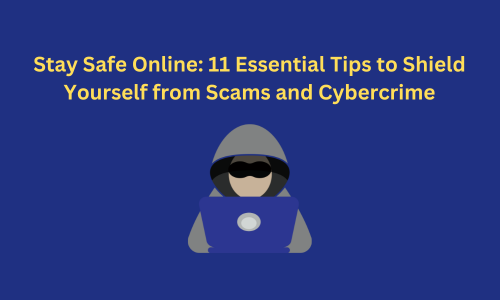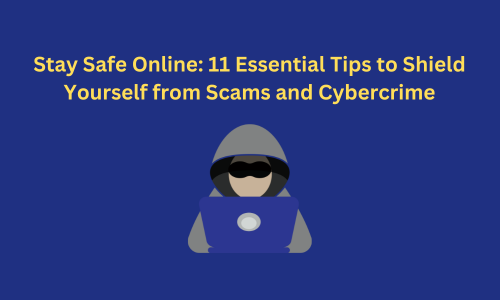Stay Safe Online: 11 Essential Tips to Shield Yourself from Scams and Cybercrime

In today’s hyper-connected world, cybercrime is rising faster than ever before, threatening individuals, businesses, and even governments. With hackers and fraudsters constantly evolving their tactics to exploit personal data, financial information, and online privacy, staying safe online has become a critical necessity. Whether you’re shopping, checking your emails, or scrolling through social media, adopting smart cybersecurity habits is key. Here are 11 practical tips to help you navigate the digital world safely and avoid becoming a victim of cybercrime.
1. Strengthen Your Passwords
Weak passwords are an open door for cybercriminals. If you're still using simple passwords like "123456" or "password," it's time to upgrade:
- Create strong, unique passwords that combine uppercase and lowercase letters, numbers, and symbols.
- Avoid using the same password for multiple accounts. If one gets hacked, others may be compromised too.
- Use a password manager to generate and store complex passwords securely.
- Always enable two-factor authentication (2FA) for an extra layer of protection.
2. Beware of Phishing Scams
Phishing remains one of the most common cyber threats, where scammers disguise themselves as legitimate organizations to steal personal information:
- Look out for red flags in emails, such as poor grammar, unfamiliar senders, or urgent requests like "Your account will be deactivated!"
- Hover over links to check if the URL matches the sender's identity. Phishing links often mimic real websites but have subtle changes.
- Never share sensitive data through email or text unless you're sure of the recipient's legitimacy. If uncertain, contact the company directly.
3. Browse Safely
Browsing the web can expose you to malware and other cyber threats, especially if you’re not cautious:
- Always ensure the website you're visiting uses HTTPS, indicated by a padlock symbol in the browser. This encrypts your data.
- Avoid conducting sensitive activities, like online banking or shopping, on public Wi-Fi. If necessary, use a Virtual Private Network (VPN) to secure your connection.
- Be cautious of pop-ups and ads, especially ones promising prizes or security alerts — these often lead to malware or phishing sites.
4. Keep Your Devices and Software Updated
Outdated software is a goldmine for hackers, who exploit vulnerabilities to infiltrate your system:
- Regularly update your operating system, apps, and security software to patch newly discovered security gaps.
- Enable automatic updates whenever possible to ensure you're always protected with the latest features.
5. Guard Your Personal Information
Oversharing on social media can make you an easy target for identity theft and other scams:
- Limit the amount of personal information you share online, including your birthdate, address, or financial details.
- Review your social media privacy settings to control who can see your posts and personal data.
6. Be Cautious with Downloads
Downloading files or apps from untrusted sources is a quick way to invite malware into your system:
- Only download files from official websites or verified app stores.
- Scan files with antivirus software before opening them, especially if they come from unknown sources.
7. Avoid Financial Scams
Financial scams are becoming increasingly sophisticated, with criminals offering fake job offers, investments, or services in exchange for upfront payments:
- Be sceptical of unsolicited offers, especially those promising easy money. If it sounds too good to be true, it probably is.
- Use secure payment methods like credit cards or trusted services (PayPal) that offer fraud protection. Avoid wire transfers or sending money to people you don’t know.
8. Stay Informed About Cyber Threats
The cybercrime landscape is constantly changing, making it essential to stay updated on new threats:
- Follow trusted cybersecurity blogs, news outlets, or government resources like the Federal Trade Commission (FTC) to keep up with the latest scams.
- Report any suspicious activity to relevant authorities. This helps disrupt cybercriminal networks and protects others.
9. Backup Your Data Regularly
Data loss can happen at any time due to malware attacks, system failures, or accidents:
- Regularly back up your important files to an external hard drive or a cloud storage service.
- For added protection, consider both online and offline backups to ensure you can recover your data in case of a cyberattack like ransomware.
10. Understand Social Engineering Tactics
Social engineering is a method where attackers manipulate emotions like fear, urgency, or trust to extract personal information:
- Scammers may impersonate trusted figures such as bank representatives or tech support to trick you into giving up sensitive data.
- Always question unusual requests, even if they come from known sources. Double-check with the person or organization directly before taking action.
11. Use Security Tools
Leveraging technology can help enhance your online security:
- Install reliable antivirus and anti-malware software to detect and block threats.
- Use a VPN to encrypt your online activities, especially on unsecured networks, to keep your browsing private and anonymous.
Final Thoughts
As cybercrime continues to rise, staying safe online requires constant vigilance and smart practices. By following these 11 tips, you can significantly reduce your risk of falling victim to scams and cyberattacks. Remember, cybersecurity is not just about safeguarding your data; it’s about being proactive in protecting yourself in an ever-evolving digital world. Stay informed, stay cautious, and take control of your online security today.
Stay safe out there!
Disclaimer: This article is provided for informational purposes only. It is not offered or intended to be used as legal, tax, investment, financial, or other advice.




